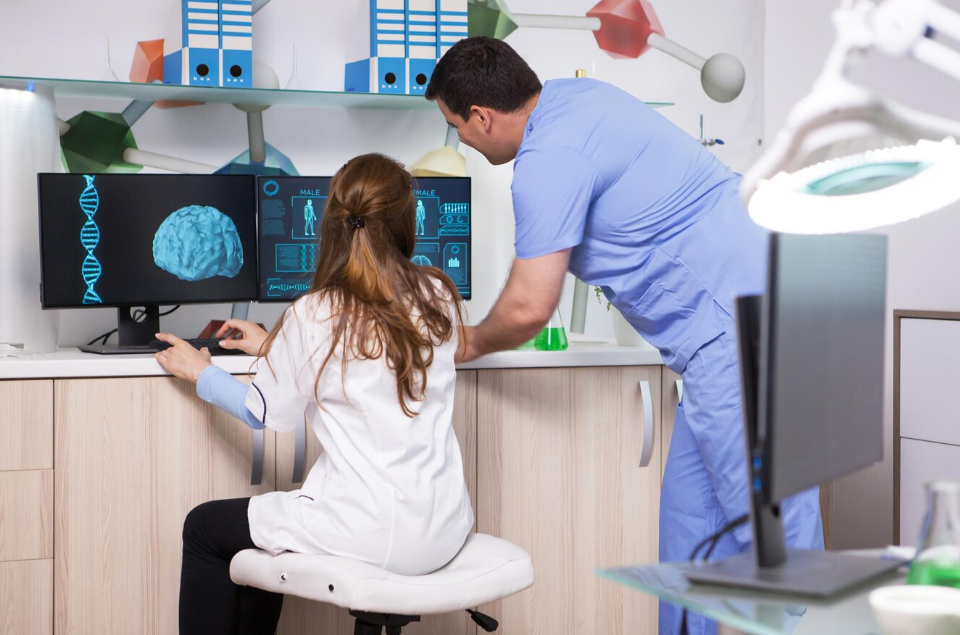Substance abuse and addiction can be daunting challenges, but your primary care doctor in Bridgeport, CT, is a trusted ally on your path to recovery. Let’s explore your substance abuse doctor’s crucial role in addressing addiction, from understanding the basics to seeking treatment and support.

Addiction involves the harmful or hazardous use of psychoactive substances, including alcohol and illicit drugs. It can lead to addiction, a chronic disease characterized by drug-seeking and use that is compulsive or difficult to control despite harmful consequences.
Here are the symptoms of addiction:
1. Loss of Control
Individuals grappling with addiction often face a profound loss of control over their substance use. Despite their best intentions, they find it exceedingly challenging to cut down or quit their addictive behaviors. This lack of control can lead to a sense of helplessness and frustration, as repeated attempts to regain mastery over their substance use often prove unsuccessful. In such situations, seeking professional guidance from your primary care doctor in Bridgeport, CT, is crucial. Your doctor can comprehensively assess your addiction, recommend appropriate treatments, and offer ongoing support to help you regain control over your life.
2. Cravings
Cravings are a relentless and overpowering component of addiction. These intense, persistent desires for the substance can be all-consuming, driving individuals to seek out and use it, even in the face of adverse consequences. Cravings can be triggered by various cues, including stress, environmental factors, or social situations associated with substance use. Your primary care doctor in Bridgeport, CT, understands the challenging nature of cravings and can assist in developing strategies to manage and cope with them effectively. Whether through counseling, medication-assisted treatment, or other interventions, your doctor can be a crucial ally in your battle against addiction.
3. Neglect of Responsibilities
One of the unfortunate consequences of addiction is the neglect of critical life responsibilities. Individuals with addiction may find themselves prioritizing substance use over essential obligations such as work, school, or family responsibilities. This neglect can have far-reaching consequences, leading to job loss, academic setbacks, or strained relationships with loved ones. Recognizing the impact of addiction on responsibilities is vital in seeking help from your primary care doctor in Bridgeport, CT. They can assist you in addressing these consequences and developing strategies to regain stability in your life.
4. Risk-Taking Behavior
Addiction often propels individuals to engage in risky behaviors they would typically avoid. While under the influence of substances, decision-making becomes impaired, and individuals may make choices they later regret. These can include driving under the influence or participating in unsafe activities that put their well-being at risk. Discussing these risky behaviors openly with your primary care doctor is essential. Your substance abuse doctor can guide harm reduction strategies, help you understand the risks associated with addiction, and support your efforts to make safer choices.
5. Tolerance and Withdrawal
Over time, addiction can lead to the development of tolerance, which means that individuals need larger amounts of the substance to achieve the desired effect. When not using the substance, they may experience withdrawal symptoms, which can range from mild discomfort to severe physical and psychological distress. Your primary care doctor in Bridgeport, CT, can be pivotal in managing tolerance and withdrawal. They can recommend medication-assisted treatment options to help reduce cravings and alleviate withdrawal symptoms, making recovery more manageable.
6. Neglecting Personal Well-being
Addiction often takes a toll on an individual’s physical and psychological health. Individuals may neglect their well-being, ignoring the adverse impact of substance use on their overall health. This neglect can lead to various health issues, from physical ailments to mental health challenges. Your primary care doctor in Bridgeport, CT, is attuned to the health implications of addiction and can provide necessary medical interventions and referrals to specialists to address these concerns.
7. Interpersonal Problems
Addiction can strain relationships and lead to conflicts with friends and family. Individuals with addiction may isolate themselves from loved ones, further deepening their loneliness and despair. Your primary care doctor in Bridgeport, CT, understands addiction’s social and interpersonal challenges. They can offer guidance on rebuilding relationships, connecting with support networks, and involving loved ones in recovery.
8. Continued Use Despite Consequences
Continued substance use despite experiencing harmful consequences is a hallmark symptom of addiction. This aspect of addiction can lead to a cycle of negative repercussions, affecting an individual’s health, legal status, and relationships. If you are caught in this cycle, reaching out to your primary care doctor in Bridgeport, CT is crucial. They can help you confront the consequences of addiction, provide guidance on accessing legal and social support services, and assist you in breaking the pattern of continued use.


Recognizing the need for help is a pivotal first step. If you or a loved one is struggling with substance abuse, it’s essential to seek assistance. Your primary care doctor in Bridgeport, CT, is an ideal starting point. Don’t hesitate to initiate the conversation, whether you’re experiencing physical symptoms, mental health issues, or just feel that substance use is interfering with your life.
Here’s when to discuss with your primary care doctor in Bridgeport, CT, about addiction:
1. Early Signs of Substance Abuse
If you or someone you know is displaying early signs of substance abuse, such as increased tolerance, withdrawal symptoms, or neglect of responsibilities, it’s crucial to reach out to your primary care doctor in Bridgeport, CT, promptly. Early intervention can prevent the progression of addiction.
2. Physical Health Issues
If you’re experiencing physical health problems related to substance use, including but not limited to liver damage, respiratory issues, or infections, it’s essential to consult your primary care doctor in Bridgeport, CT. They can assess your health, provide necessary medical interventions, and connect you with addiction treatment resources.
3. Mental Health Concerns
Addiction often co-occurs with mental health issues such as depression, anxiety, or trauma. If you’re grappling with both substance use and mental health challenges, discussing these concerns with your primary care doctor in Bridgeport, CT, is essential. They can provide a holistic approach to treatment and help you access mental health services.
4. Failed Quitting Attempts
If you’ve made multiple attempts to quit or reduce substance use but have been unsuccessful, it’s an opportune time to consult your primary care doctor in Bridgeport, CT. They can evaluate your situation, recommend evidence-based treatments, and offer ongoing support to increase your chances of successful recovery.
5. Interference with Daily Life
When substance use starts interfering with your daily life, including work, relationships, or responsibilities, it indicates it’s time to seek help. Your primary care doctor in Bridgeport, CT, can assess the extent of the interference and guide you toward appropriate treatment options.
Doctors from a trusted clinic like Docs Primary Care – Bridgeport is your advocate in the journey to recovery. They will approach the situation with empathy, compassion, and professionalism. Expect a non-judgmental environment where you can openly discuss your concerns.
During your visit, here’s what your primary care doctor in Bridgeport, CT, may do:

When you initiate a conversation with your primary care doctor in Bridgeport, CT, about addiction, you can expect a comprehensive assessment to understand the depth and impact of your substance abuse and addiction. This assessment often involves discussing your medical history, substance use patterns, and any co-occurring addiction-related physical or mental health issues. Your substance abuse doctor will inquire about your symptoms, the duration of substance use, and any previous attempts at recovery. This in-depth evaluation forms the foundation for designing an effective treatment plan tailored to your needs.
Following the assessment, your primary care doctor in Bridgeport, CT, will offer personalized medical advice based on their evaluation of your condition. This advice may encompass various aspects, including the physical health consequences of substance use. Your substance abuse doctor will discuss potential risks associated with your addiction, such as liver damage, respiratory issues, or infectious diseases. If applicable, they will guide you in managing withdrawal symptoms and address any immediate health concerns related to your substance use. This medical advice is a crucial starting point for your journey to recovery.
Your doctor for drug addiction is well-versed in the array of treatment options available for addiction. Considering your unique circumstances and preferences, they will discuss these options with you. Treatment options may encompass medication-assisted treatment (MAT), individual or group counseling, participation in support groups, or referrals to addiction specialists and rehabilitation facilities. Your doctor for drug addiction will collaborate with you to create a tailored treatment plan that aligns with your goals and addresses your specific needs. This collaborative approach ensures that your recovery plan is well-suited to your situation, increasing the likelihood of successful outcomes.

Recovery from addiction is a journey that often requires ongoing support and monitoring. Your primary care doctor in Bridgeport, CT, is committed to being your steadfast ally throughout this process. They may schedule regular follow-up appointments to monitor your progress, assess the effectiveness of your treatment plan, and make necessary adjustments. Beyond medical care, your doctor for drug addiction also offers valuable emotional support, understanding the challenges you face, and providing guidance on coping strategies. This support is essential for navigating the complexities of addiction recovery and maintaining your motivation to achieve lasting sobriety.
Confidentiality is a cornerstone of healthcare, particularly when it comes to discussing sensitive topics such as addiction. You can trust that your conversations with your primary care doctor about addiction in Bridgeport, CT, will be held in strict confidence. This confidentiality ensures that you can openly share your concerns, fears, and experiences without the fear of judgment or the risk of your information being disclosed to others. It creates a safe and non-judgmental space to seek the help and guidance you need.
Recognizing that addiction often requires a multidisciplinary approach, your primary care doctor in Bridgeport, CT, may refer you to specialists, therapists, or support groups as part of your treatment plan. These referrals are intended to provide additional resources and assistance tailored to your needs. Specialists may include addiction psychiatrists, psychologists, or counselors with expertise in addiction treatment. Support groups offer a sense of community and shared experiences, which can be instrumental in your recovery journey.
Addiction is a complex disease, but it is treatable. Your primary care doctor, in collaboration with addiction specialists, can help you access appropriate treatment. Here are some treatment options for dealing with addiction:
1. Detoxification (Detox)
The initial phase of addiction treatment, detoxification, is a critical step toward recovery. Under the supervision of your trusted primary care doctor in Bridgeport, CT, you will undergo a carefully managed process of gradually withdrawing from the substance. This process is conducted in a medical setting to ensure safety and comfort. Detox can be challenging, as withdrawal symptoms may manifest, varying in intensity depending on the substance and individual factors. However, your primary care doctor can prescribe medications to alleviate discomfort and cravings, making detox more manageable. During detox, the goal is to allow your body to eliminate the drug while minimizing the physical and psychological distress associated with withdrawal.
2. Medication-Assisted Treatment (MAT)
MAT is a well-established and evidence-based approach to addiction treatment. It combines medications with counseling and behavioral therapies to address addiction comprehensively. Your trusted primary care doctor in Bridgeport, CT, may prescribe medications such as methadone, buprenorphine, or naltrexone as part of MAT. These medications are strategically employed to reduce cravings, minimize withdrawal symptoms, and prevent relapse. MAT is tailored to your unique needs, and your doctor will closely monitor your progress throughout the treatment. Whether you receive these medications from your primary care doctor or a specialized MAT clinic, the goal is to support your recovery journey effectively.
3. Behavioral Therapy
Behavioral therapy is a cornerstone of addiction treatment, and your trusted primary care doctor in Bridgeport, CT, is well-equipped to provide or refer you to these essential services. Various forms of behavioral therapy, such as cognitive-behavioral therapy (CBT), contingency management, and motivational enhancement therapy, can help you address addiction’s psychological and emotional aspects. CBT, for example, assists in identifying the underlying causes of addiction and developing strategies to modify unhealthy behaviors and thought patterns. Through counseling and therapy sessions, you can explore the root causes of your addiction, tackle traumas or triggers, and develop valuable coping mechanisms to prevent relapse. Your primary care doctor ensures you have access to these evidence-based therapies to support your recovery.
4. Support Groups
Support groups, like Alcoholics Anonymous (AA) and Narcotics Anonymous (NA), play a pivotal role in addiction recovery by fostering a sense of community and shared experiences. Your trusted primary care doctor in Bridgeport, CT, can recommend local support groups or organizations aligned with your needs. These groups provide a platform for individuals in recovery to connect, share their personal stories, and receive support from peers who understand their struggles. The camaraderie and encouragement support groups offer are invaluable in maintaining motivation, building resilience, and preventing isolation during your recovery journey. Your primary care doctor recognizes the significance of this support network in enhancing your overall well-being.
5. Counseling and Therapy
Individual and group counseling sessions with trained therapists are integral to addiction treatment. Your trusted primary care doctor can either provide counseling services or refer you to a licensed therapist or counselor specializing in addiction. These sessions offer a safe and confidential environment to delve into addiction’s emotional and psychological aspects. You can explore underlying traumas, triggers, and emotional patterns contributing to addiction through counseling. Therapists work collaboratively with you to develop strategies for relapse prevention and equip you with the tools needed for long-term sobriety. Your primary care doctor ensures you have access to these therapeutic resources, recognizing their crucial role in your recovery journey.
6. Comprehensive Treatment Plans
Effective addiction treatment often involves a holistic and personalized approach. Your trusted primary care doctor in Bridgeport, CT, collaborates with addiction specialists to create a comprehensive treatment plan tailored to your unique needs. This plan may include detoxification, medication-assisted treatment, behavioral therapy, and ongoing support. The combination of these approaches ensures a well-rounded and individualized strategy for your recovery. Your primary care doctor guides you through each step of the treatment plan, continually assessing your progress and adjusting the approach as necessary to maximize your chances of achieving lasting sobriety.
7. Long-Term Management
Recovery from addiction is an ongoing journey that requires long-term management and support. Your trusted primary care doctor or addiction specialist plays a central role in this phase of your recovery. Regular check-in appointments are scheduled to monitor your progress, assess the effectiveness of your treatment plan, and provide ongoing support. These appointments allow your healthcare provider to track your sobriety, address any emerging challenges or triggers, and make necessary adjustments to your treatment. The goal is to help you maintain sobriety, manage cravings, and prevent relapse, ensuring that you continue progressing toward a healthier and addiction-free life.
Recovery from addiction can be a challenging journey with its ups and downs. If you’ve had an initial conversation with your primary care doctor about addiction, and you feel it didn’t lead to the desired outcomes, it’s important not to lose hope. Your journey to recovery is ongoing, and there are several proactive steps you can take to further your progress:
1. Seek a Second Opinion
If you feel that your current treatment plan or the advice provided by your primary care doctor does not align with your needs or expectations, consider seeking a second opinion. Consult with another trusted healthcare provider, preferably one specializing in addiction medicine or psychiatry. They may offer fresh insights, alternative treatment options, or a different perspective on your recovery journey.
2. Explore Specialized Treatment Centers
Addiction treatment is a highly specialized field, and some individuals may benefit from the services and expertise available at dedicated addiction treatment centers. These centers often have multidisciplinary teams of professionals, including addiction specialists, therapists, and counselors, who can provide tailored treatment plans and intensive support.
3. Engage in Additional Therapies
Addiction recovery may benefit from a combination of therapeutic approaches. In addition to any counseling or therapy sessions you’ve already participated in, consider exploring other evidence-based therapies, such as art therapy, music therapy, or equine therapy. These complementary approaches can provide alternative ways to address addiction’s emotional and psychological aspects.
4. Reevaluate Your Goals
Sometimes, it’s necessary to revisit your recovery goals and expectations. Addiction recovery is a highly individualized process, and you must be realistic about the challenges and setbacks you may encounter. Discuss your goals and concerns openly with your healthcare provider to ensure they align with your current circumstances and aspirations.
Start Your Journey to Wellness—Seek a Primary Care Doctor in Bridgeport, CT, Today!
Your primary care doctor in Bridgeport, CT, is your partner in the journey to recovery. We at Docs Primary Care – Bridgeport are committed to your well-being and our dedicated team of experts and doctors can help you access the resources and support you need to overcome addiction. Remember that seeking help is a courageous step towards a brighter, healthier future.
Contact Docs Primary Care – Bridgeport today to start your journey to recovery!


During this surge in COVID-19 cases, our primary focus is meeting the high demand for tests, and we are seeing higher than usual wait times. This means we are unable to answer most phone calls. Please know that our teams are working very hard during this time to care for as many patients as safely as possible. Please click the button below for answers to common questions. We appreciate your understanding.